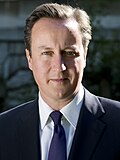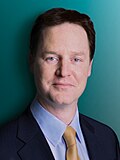2015 United Kingdom general election
The United Kingdom general election of 2015 elected the 56th Parliament of the United Kingdom. It was held on 7 May 2015. The three main political parties after the election are the Conservatives, the Labour Party and the Scottish National Party. The Conservative Party won enough seats to form a majority government.
| |||||||||||||||||||||||||||||||||||||||||||||||||||||||||||||||||
All 650 seats in the House of Commons 326 seats needed for a majority | |||||||||||||||||||||||||||||||||||||||||||||||||||||||||||||||||
|---|---|---|---|---|---|---|---|---|---|---|---|---|---|---|---|---|---|---|---|---|---|---|---|---|---|---|---|---|---|---|---|---|---|---|---|---|---|---|---|---|---|---|---|---|---|---|---|---|---|---|---|---|---|---|---|---|---|---|---|---|---|---|---|---|---|
| Opinion polls | |||||||||||||||||||||||||||||||||||||||||||||||||||||||||||||||||
| Turnout | 66.4%[1] ( | ||||||||||||||||||||||||||||||||||||||||||||||||||||||||||||||||
| |||||||||||||||||||||||||||||||||||||||||||||||||||||||||||||||||
 Colours denote the winning party, as shown in the main table of results. * Figure does not include the Speaker of the House of Commons John Bercow, who was included in the Conservative seat total by some media outlets. | |||||||||||||||||||||||||||||||||||||||||||||||||||||||||||||||||
| |||||||||||||||||||||||||||||||||||||||||||||||||||||||||||||||||
Voting took place in all 650 parliamentary constituencies of the United Kingdom, each electing one Member of Parliament to the House of Commons, the lower house of Parliament. Local elections also took place in most of England on the same day, but not Greater London.
Results change
- 330 Conservative Party MPs were elected (up 28)
- 232 Labour Party MPs were elected (down 24)
- 8 Liberal Democrat MPs were elected (down 48)
- 56 Scottish National Party MPs were elected (up 50)
- 8 Democratic Unionist Party MPs were elected (up 1)
- 4 Sinn Féin MPs were elected (down 1)
- 3 Plaid Cymru MPs were elected (no change)
- 2 Ulster Unionist Party MPs were elected (up 2)
- 3 Social Democratic and Labour Party (no change)
- 1 UK Independence Party MP was elected (down 1)
- 1 Green Party of England and Wales MP was elected (change of 0)
- 1 independent MP
Also, the Speaker of the House of Commons John Bercow, who does not have a political party, was re-elected.
Some important Labour MPs lost their seats including the Shadow Chancellor Ed Balls and the leader of the Scottish Labour Party, Jim Murphy.
Many important Liberal Democrat MPs who had served in the coalition government also lost their seats, including business secretary Vince Cable, energy secretary Ed Davey and chief secretary to the treasury Danny Alexander.
Aftermath change
The Conservative Party won 330 seats and managed to form a majority government. David Cameron continued as Prime Minister. Miliband, Clegg and Nigel Farage all resigned as leaders of their parties. Jim Murphy also resigned as leader of Scottish Labour. [2]
Notes change
- ↑ SNP party leader Nicola Sturgeon, a Member of the Scottish Parliament and First Minister of Scotland, participated in some of the main UK-wide televised debates, but did not stand for a Commons seat at this election. Angus Robertson, MP for Moray at the time, was the leader of the SNP delegation to the House of Commons.
References change
- ↑ "The May 2015 UK elections: Report on the administration of the 7 May 2015 elections, including the UK Parliamentary general election" (PDF). p. 3.
- ↑ Election 2015. BBC News. [1]



